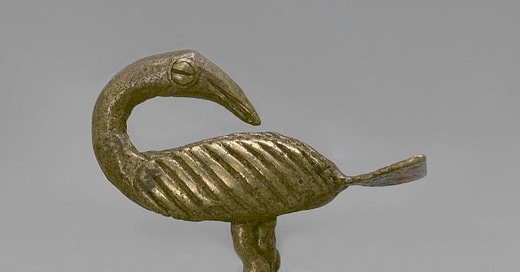
In 1985 Ghana started to put significant money into becoming a tourist destination. They found a significant market in “roots” tourism for those in the African diaspora seeking a reconnection with their heritage. What scholars found in the intervening three and a half decades was that the construction of race, gender, and nationality in Ghana is quite different from —sometimes even at odds with— how they look in the United States. “For [B]lack American men,” writes the anthropologist Edward M. Bruner, “a return to Africa is a return to manhood, to a land where they feel they belong, where they can protect their women, and where they can reconnect with their ancestry.” Ghanian men, meanwhile, say they are scandalized by how American women dress. Here already we see Black women caught in a double bind: they are seeking an authentic connection to their African ancestry but must contend with the modern misogyny of the men selling that connection. And while Black Americans expect to be coming “home” in a sense by visiting Ghana, what they may find are Ghanaians who will serve white customers before local Ghanaians and who call Black Americans racist for requesting heritage tours where no white people are allowed.
In another account by Perry Labron Carter he speaks to a Ghanian tour guide that disparagingly reports witnessing Black American tourists “who nearly lynched the white person who was in their group!” They had become understandably upset as the description of the trans-Atlantic slave trade became more intense and graphic. The tour guide said he has since successfully avoided it happening again by, “encourag[ing Black American tourists] to take the tour as a personal triumph for coming to see where their ancestors hail from and to seek reconciliation not revenge.”2
The reason for this seemingly strange behavior lies in how Ghanaians construct race and nationality in more recent postcolonial contexts. For Ghanaians, according to Bruner, all Americans are, “obruni, which means ‘whiteman,’ but the term is extended to Europeans, Americans, and Asians regardless of skin color, so it also has a meaning of foreigner.” Bruner even has a tour guide tell him that he is especially suspicious of American tourists, no matter the skin color, because they could turn out to be “CIA agents” sent to topple African governments. (And with the way the CIA currently bills itself, who could blame them?) Black Americans, having read the tourism literature of Ghanaian travel firms, expect to be returning to an ancestral home, only to be treated as just as much of a foreigner —perhaps even a colonizer— as a white person.
Moreover, Black Americans find that part of the stories told at these former slave trading forts is the uncomfortable truth that, in Perry’s words, “Ghanaians, Africans, sold other Africans into enslavement to Whites.” So what often begins as an effort by Black Americans to realize a social truth about what it means to be part of the Black diaspora, becomes a more painful process of reconciling two histories and race configurations that have been constructed on either side of the Atlantic. For Black Americans, their trip is meant to focus on the African slave trade that began in the 1600s. But for Ghanaians, the slave trade was one of many kinds of colonization that began with Portuguese traders and continues today with American hegemony.
The psychic scars of the Atlantic slave trade are deep – and even the metaphor of deformed, healed-over tissue is inadequate because new wounds are opened even as old ones close. Indeed, Bruner even describes a Black American expat couple that moves to Ghana to establish a company called One Africa Productions that runs tours and puts on performances that are meant to appeal directly to the expectations of Black American tourists. The contradictions abound as this couple describes the Ghanian Tourist Board’s attempts to develop an economy based on international tourism as “white washing” the “[B]lack man’s history.”
In my brief time visiting Ghana I went to those slave forts. It is an undoubtably moving experience, even for a white guy like me. When we speak of generational trauma it seems more like a scar than an active wound constantly reopened. The least generous will say “that was a long time ago.” But for those paying attention they can point to the division across the Atlantic –a diaspora marked by forced labor and wave upon wave of colonial extraction—and say that even those living and breathing today must actively work to rebuild a connection that was torn apart.




